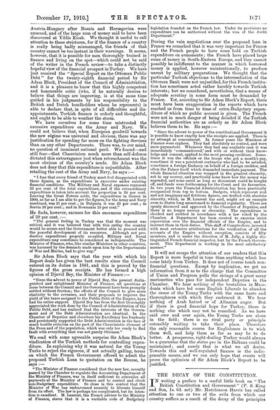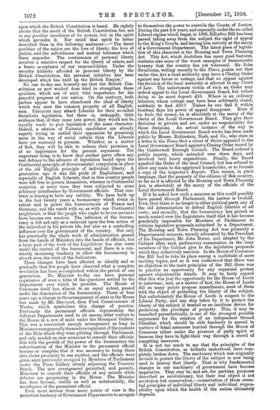THE DECAY OF THE CONSTITUTION.
IN writing a preface to a useful little book on "The British Constitution and Government" (P. S. King and Son, is. 6d. net) Mr. Hutchinson Harris has called attention to one or two of the evils from which our country suffers as a result of the decay of the principles upon which the British Constitution is based. He rightly insists that the merit of the British Constitution lies, not in any peculiar excellence of its system, but in the spirit which pervades it. Nor could that spirit be better described than in the following sentences :—" The finest qualities of the nation are the love of liberty, the love of justice, and the self-reliance and mutual tolerance which these engender. The continuance of personal liberty involves a sensitive respect for the liberty of others, and a brave acceptance of our responsibilities. Under the security hitherto afforded to personal liberty by the British Constitution, the personal initiative has been developed which has built up the British Empire."
No one to-day can honestly say that the British Con- stitution as now worked does tend to strengthen these qualities, which are of such vital importance for the peaceful progress of our nation. On the contrary, both parties appear to have abandoned the ideal of liberty which was once the common property of all English- men. Unionists may attack Liberals for their so-called Socialistic legislation, but there is, unhappily, little evidence that, if they came into power, they would not be equally ready to pass legislation of the same character. Indeed, a section of Unionist candidates are already eagerly trying to outbid their opponents by promising more in the way of social reform than the Liberals have yet ventured to promise. Whether, as a matter of fact, they will be able to redeem their promises is of no importance for the present argument. The important thing is to know that neither party offers any real defence to the advance of legislation based upon the Continental principle of Governmental compulsion in place of the old English principle of individual liberty. A generation ago it was the pride of Englishmen, and especially of English Liberals, that in this country people were left free to govern themselves, whereas in Continental countries at every turn they were subjected to some arbitrary interference by Government officials. That con- trast is ceasing to have any validity. We have built up in the last twenty years a bureaucracy which rivals in extent and in power the bureaucracies of France and Germany, and the result with us, as with our Continental neighbours, is that the people who ought to be our servants have become our masters. The influence of the bureau- cracy is felt not only as a restraint upon the free action of the individual in his private life, but also as a controlling influence over the government of the country. Not only has practically the whole work of administration passed from the hands of Ministers into the hands of officials, but a large part of the work of the Legislature has also come under the control of the bureaucrat, and there is a con- stantly increasing tendency to allow the bureaucracy to absorb even the work of the Judicature.
These changes have been effected so silently and so gradually that few people have observed what a complete revolution has been accomplished within the period of one generation. No Minister to-day can have personal cognisance of even a tithe of the questions settled by the Department over which he presides. The House of Commons itself has, almost to an equal extent, passed under the domination of the bureaucracy. Three or four years ago a change in the arrangement of seats in the House was made by Mr. Harcourt., then First Commissioner of Works, which symbolises this change of practice. Previously the permanent officials representing the different Departments used to sit among other visitors to the House in a row of seats under the Strangers' Gallery. This was a convenient enough arrangement as long as Ministers were generally themselves cognisant of the contents of the Bills which they were piloting through Parliament, and only needed on rare occasions to consult their officials. But with the growth of the power of the bureaucracy the subordination of the Minister to the permanent official became so complete that it was necessary to bring them into closer proximity to one another, and the officials were given seats previously occupied by Members of Parliament under the Press Gallery closely adjoining the Treasury Bench. The new arrangement permitted, and permits, Ministers to consult their officials at any minute while debates are progressing in the House. The Minister has thus become, visibly as well as substantially, the mouthpiece of the permanent official. Even more serious from many points of view is the persistent tendency of Government Departments to arrogate to themselves the power to override the Courts of Justice. During the past few years, and especially under the so-called Liberal regime which began in 1906, Bill after Bill has been passed taking away from the subject the right of appeal to the King's Courts, and leaving him entirely at the mercy of a Government Department. The latest piece of legisla- tion of this character is the Housing and Town Planning Act. This Act, which doubtless has many good features, contains also some of the worst examples of bureaucratic tyranny that the country has yet witnessed. Sir John Swinburne, writing recently to the Times, points out that under this Act a local authority may issue a Closing Order against any house or cottage, and that no appeal against the decision of the local authority is allowed to any Court of Law. The unfortunate victim of such an Order may indeed appeal to the Local Government Board, but before doing so he must deposit £10. Where is an ordinary labourer, whose cottage may have been arbitrarily closed, suddenly to find ..t10 ? Unless he can find it within fourteen days his power of appeal disappears. Even if he finds the money, he is absolutely at the mercy of the clerks of the Local Government Board. They give their decisions in private, and are under no responsibility for those decisions. An actual instance of the way in which the Local Government Board works has been made public by Messrs. Rubinstein, Nash, and Co., who state in a letter to the Times that a client of theirs appealed to the Local Government Board against a Closing Order issued by the Camberwell Borough Council. The Board ordered a public inquiry, which extended over three days, and involved very heavy expenditure. Finally, the Board quashed the Order of the local Council, but has refused to allow any costs to the aggrieved householder, or to furnish a copy of the inspector's Report. This means, in plain language, that the property of the citizens of this country, so far as it is affected by the Housing and Town Plsoning Act, is absolutely at the mercy of the officials of the Local Government Board.
If it be asked how such a measure as this could possibly have passed through Parliament, the answer is twofold. First, that there is no longer in either political party any of the old determination to defend English liberties at all costs ; and secondly, that the bureaucracy has gained so much control over the Legislature itself that it has become practically impossible for Members of Parliament to criticise legislative proposals submitted by a Department. The Housing and. Town Planning Act was primarily a Departmental measure, warmly advocated by the President of the Department, Mr. John Burns, and adopted by the Cabinet after such perfunctory examination as the busy members of the Cabinet give to the legislative proposals which they collectively sanction. In the House of Commons the Bill had to take its place among a multitude of more exciting topics, and as it was understood that there was no objection to the main principles of the Bill, there was in practice no opportunity for any organised protest against objectionable details. It may be fairly argued that this was just th3 opportunity for the House of Lords to intervene ; and, as a matter of fact, the House of Lords did on many points propose amendments, most of them with the object of protecting the liberty of the subject. But unfortunately the House of Lords is suspect to the Liberal Party, and any step taken by it to protect the liberty of the subject is treated as an insidious device for protecting the privileges of property. This, it may be remarked parenthetically, is one of the strongest possible arguments for the creation of an independent Second Chamber, which should be able fearlessly to amend in matters of detail measures hurried through the House of Commons either under the pressure of party spirit or because they have to fight their way through a crowd of competing measures. It is not too much to say that the principles of the British Constitution, as hitherto understood, have com- pletely broken down. The machinery which was originally devised to protect the liberty of the subject is now being used to destroy that liberty. That is why fundamental changes in our machinery of government have become imperative. They may be, and are, for partisan purposes described as revolutionary, but their real object is not revolution but conservation,—conservation of those essen- tial principles of individual liberty and individual respon. sibility upon which the health of the nation ultimately depends.























































 Previous page
Previous page